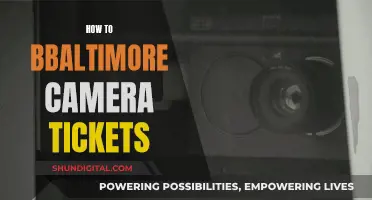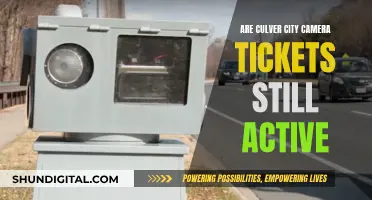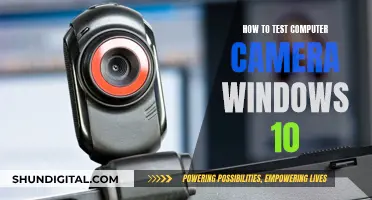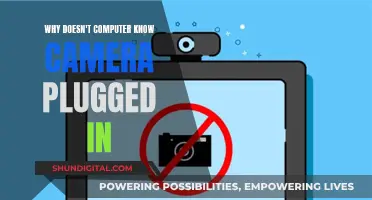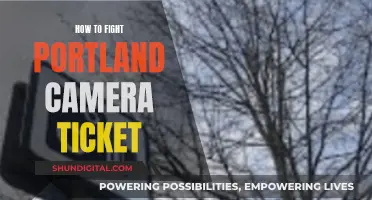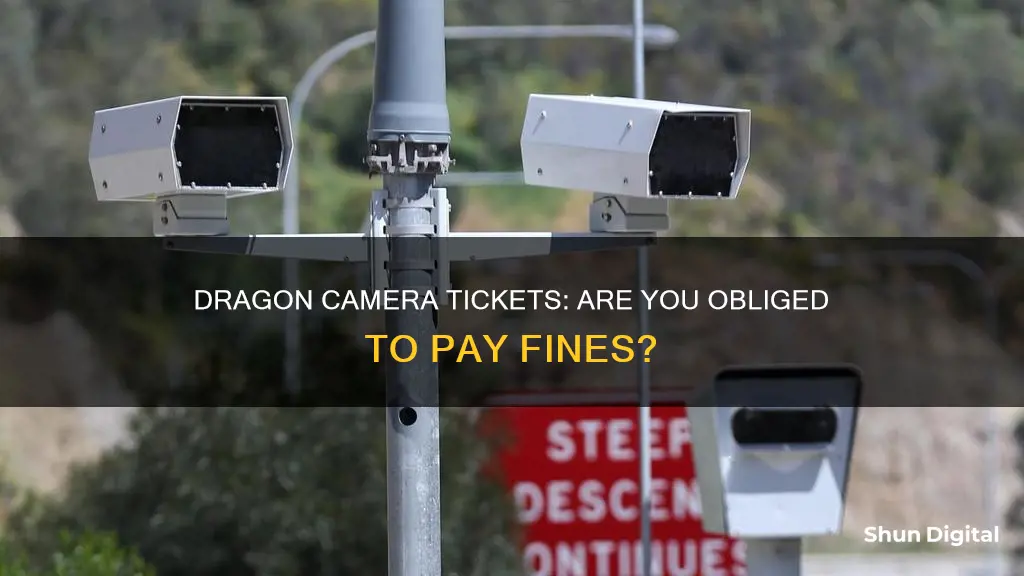
Traffic camera tickets, also known as camera tickets, are issued when a traffic camera captures a vehicle violating a traffic law. These tickets are typically sent to the owner of the vehicle by mail and are considered civil violations. While they do not carry the same weight as a ticket issued by a police officer, failing to pay camera tickets can result in consequences such as booting or towing of the vehicle. The legality and enforcement of camera tickets vary by location, with some states or cities banning their use while others actively employ them. It is important to understand the specific regulations and potential repercussions associated with camera tickets in your area.
What You'll Learn
- Camera tickets are civil violations against the vehicle, not the driver
- In Texas, red light camera tickets are banned and cannot be charged
- Failing to pay a ticket can result in your car being booted or towed
- Camera tickets are harder to fight than tickets from police officers
- Consult a lawyer for advice on whether to pay fines in legal grey areas

Camera tickets are civil violations against the vehicle, not the driver
Camera tickets are civil violations issued when a traffic camera captures a vehicle violating a traffic law. These tickets are processed similarly to parking tickets and are considered a civil violation against the vehicle, not the driver. As such, they are not reported to the DMV or insurance companies and will not appear on your driving record. However, if left unpaid, camera tickets can result in consequences such as booting or towing of the vehicle.
In most cases, the ticket is mailed to the registered owner of the vehicle, regardless of who was driving at the time of the infraction. This can be confusing, especially in situations where the owner of the vehicle was not the one driving. It's important to note that the owner of the vehicle is typically held liable for camera tickets, even if they were not driving when the violation occurred.
If you receive a camera ticket and you were not the driver, you have the option to file a Declaration of Non-Responsibility. This is a sworn statement asserting that you were not in possession or control of the vehicle at the time of the violation. However, this option may not be available in all jurisdictions, and the effectiveness of this declaration may depend on the circumstances and the vehicle's history of violations.
While camera tickets themselves do not carry the same weight as a ticket issued by a police officer, ignoring them can still lead to significant consequences. Accumulating unpaid camera tickets can result in your vehicle being booted or towed. Additionally, in some cases, unpaid tickets may cause the Department of Licensing (DOL) to place a hold on your vehicle registration.
It's worth mentioning that fighting a camera ticket can be challenging and costly. The process is typically handled by a city employee acting as a hearing officer, and they often rely solely on photo or video evidence to determine guilt. Consulting with an attorney can be beneficial, especially if you have a strong case for contesting the ticket.
Charging the Digi Cool Camera: A Quick Guide
You may want to see also

In Texas, red light camera tickets are banned and cannot be charged
In Texas, red light camera tickets cannot be charged, and you are not required to pay them. The Texas Legislature banned the use of photographic traffic enforcement systems in 2019. According to the Texas Transportation Code, a "local authority may not issue a civil or criminal charge or citation for an offense or violation based on a recorded image produced by a photographic traffic signal enforcement system."
This ban applies to all cities and municipalities in Texas, prohibiting the use of traffic signal enforcement devices and red light cameras. Local governments are not allowed to issue citations or complaints or seek civil or criminal penalties based on images from traffic camera systems. Additionally, cities are prohibited from implementing or operating traffic camera systems within their boundaries.
However, there is an exception to this ban. The law permits cities that contracted with third parties to install and monitor traffic cameras to continue using them until the contracts expire. Cities like Humble, Amarillo, Leon Valley, and Balcones Heights fall under this exception and still have operational traffic cameras.
While you are not legally required to pay red light camera tickets in Texas, there can be some consequences for non-payment. Your unpaid fine will be sent to a collection agency, and you may receive collection calls. Additionally, the Texas Department of Motor Vehicles or your local county assessor-collector can refuse to register the vehicle involved in the violation, known as a "scofflaw block." However, some counties may choose not to enforce this block.
It is important to note that while red light camera tickets are banned in Texas, other types of camera tickets, such as speed camera tickets, may still be enforceable in certain areas. The laws and regulations regarding camera tickets can vary from state to state and even within different counties or cities.
Best Cameras for RAW Photography Enthusiasts
You may want to see also

Failing to pay a ticket can result in your car being booted or towed
Failing to pay a ticket can have several consequences, and one of the most inconvenient outcomes is having your car booted or towed. This typically happens when you accumulate a certain amount of unpaid tickets, which can vary by location. For example, in New York City, your car may be booted or towed if you have more than $350 in parking ticket judgments.
When you receive a camera ticket, it is a civil violation against your vehicle and not a personal violation. This means that the ticket does not get reported to the DMV or your insurance company. While it may be tempting to ignore these tickets, failing to pay them can eventually lead to your car being booted or towed.
The process of booting and towing involves multiple fines and penalties. First, your car is ticketed and booted, with a notice giving you a two-hour window to remove the boot. If you do not pay the fine and release the boot within this timeframe, your car will then be towed, resulting in additional fees.
To avoid the inconvenience and expense of having your car booted or towed, it is generally advisable to pay camera tickets promptly. While it may seem like an unnecessary expense, the alternative can be much more costly and disruptive.
Charging the Explore One HD Camera: A Quick Guide
You may want to see also

Camera tickets are harder to fight than tickets from police officers
In many places, traffic cameras have become a common way to capture and issue traffic violations without police intervention. However, the use of these devices is controversial, with some states and cities banning them.
Camera tickets are considered civil violations against the vehicle, not the driver, and are thus similar to parking tickets. They are also typically not reported to the DMV or insurance companies and do not count against the driver's record or increase insurance costs.
While you can choose not to pay camera tickets, there may be consequences such as booting or towing of the vehicle, or the blocking of vehicle registration. In some cases, unpaid fines may also affect your credit score.
Fighting camera tickets can be harder than fighting tickets from police officers. This is because they are handled by city employees who are not judges, and the court rules are different. It is easier for them to find you guilty based on the photo or video evidence. Additionally, the cost of fighting these tickets can be high.
On the other hand, if you do not pay a ticket issued by a police officer, there may be more severe consequences, such as a warrant for your arrest and the suspension of your license. Therefore, it is generally recommended to consult a lawyer for such tickets.
Editing Raw Photos: Bridge and Camera Raw Mastery
You may want to see also

Consult a lawyer for advice on whether to pay fines in legal grey areas
Camera tickets, also known as dragon tickets, are civil violations issued when a traffic camera captures a vehicle breaking a traffic law. These tickets are mailed to the owner of the vehicle and are not reported to the DMV or insurance companies. While some may choose to ignore these tickets, it is important to note that they can result in consequences such as booting or towing of the vehicle.
Consulting a lawyer is always a good idea when dealing with legal grey areas, such as camera tickets. A lawyer can provide specific advice based on your circumstances and location, as laws vary by state and country. In the case of camera tickets, a lawyer can advise you on your options, which may include paying the fine, fighting the ticket, or exploring alternative solutions.
For example, in the state of Victoria, Fines Victoria is responsible for processing and enforcing fines. They offer resources and information to help individuals understand their options, such as requesting a payment arrangement or an enforcement review. Additionally, community legal centres can provide free legal information and advice on these matters.
In the United States, the consequences of not paying a court-ordered fine can be serious. While jail time is typically only imposed on those who have the means to pay but refuse to do so, judges have the power to issue bench warrants or probation violation hearings for unpaid fines. It is up to the defendant to prove their inability to pay, and they may face additional consequences such as interest, fees, suspension of licenses, and seizure of property.
When dealing with fines in legal grey areas, it is essential to consult a lawyer to understand your rights and options. They can guide you through the process, provide advice tailored to your situation, and help you navigate the complex legal system to achieve the best outcome.
Florida School Bus Camera Tickets: What's the Law?
You may want to see also


